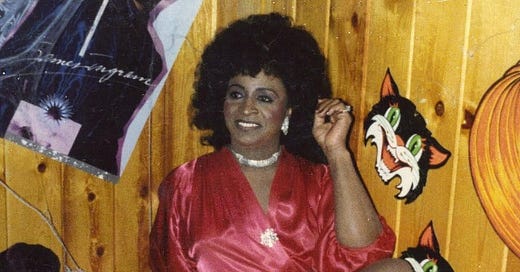Bricks and Bottles: Marsha P. Johnson and Josie Carter (Un-paywall'd)
Banned Histories of Race in America
This week I’m sharing a previously-paywall’d piece from last year about Black queer history that is too often overlooked and that everyone should know. Please enjoy and happy pride!
On June 28, 1969, the NYPD raided a gay bar in Lower Manhattan called the Stonewall Inn. This set off a series of riots often referred to as the Stonewall Uprising. The first brick of the riots was thrown by Marsha P. Johnson, a Black trans woman. A year later, to commemorate the riots the first Gay Pride parades began.
So, how did an anti-cop riot set off by a brick-throwing Black trans woman turn into the focus of so much corporately synergistic capitalist exploitation? Well, have you heard of the Toyota MLK Day Sales Event? I mean, Jesus said to sell all your possessions, give to the poor and follow him and somehow that got turned that into “Go deeply into debt to celebrate my birthday!” If capitalism can do that to MLK and Jesus, what do you think it will do to the legacy of Marsha P. Johnson?
Before the LGBTQ movement was the LGBTQ movement, there was something called the Homophile Movement. Comprised of many local and national groups seeking LGBTQ rights, the Homophile Movement began around 1950 and often engaged in the forms of political action you’re probably familiar with.
For example, in 1965, a Philadelphia restaurant called Dewey’s refused to serve “homosexuals,” “masculine women,” “feminine men,” and “persons wearing nonconformist clothing”. Now, while that last one may seem a little on the nose, at the time many cities and towns actually had trans-erasure laws. These laws spread across the country in the mid 1800s and became known as “masquerade laws”. Eventually these laws were known as “the three-piece law” or “three-article rule” because the police could arrest anyone for not wearing at least three articles of clothing confirming their gender assigned at birth.
And so, on April 2, 1965, somewhere around 150 community members showed up to Dewey’s and refused to leave. Three protestors were arrested and Dewey’s stayed on their bullshit. Then, on May 2, the sit-in was repeated but somehow this time no one was arrested. Dewey’s couldn’t take the heat and it changed its policy.
Victory! Of course, not every situation can work out so cleanly. Some are more urgent, like the Black Nite Brawl, for example. On August 5, 1961, eight years before Stonewall, in Milwaukee, WI, four homophobes made their way into a gay bar called The Black Nite. They became belligerent and were asked to leave. They refused and then Wayne the bouncer made them leave. Then they started fighting Wayne. Enter: Black Queen Josie Carter.
As Josie told Brice Smith of the Milwaukee Transgender Oral History Project, “Wayne was a bouncer, remember, and he had fought those three guys and I went out there with a beer bottle in each hand… And the guy came over… I popped him right here, and the blood went psssssss, and he fell to the ground.”
The three homophobes then left in order to take the fourth to the hospital. Then they came back. With friends. Instead of four, this time it was between 12 and 20. Whatever they thought they were going to do, the 75 Black Nite patrons kept them from doing it. Three of the homophobes were eventually arrested. In the end, as you might’ve guessed, the charges were dropped.
The Black Nite bar was in Milwaukee’s first gay neighborhood, known at the time as “The Strip”. Much of the strip—including the site of The Black Nite—was demolished in 1965. Milwaukee leadership at the time said the destruction was necessary to build a freeway. But according to the Wisconsin LGBTQ History Project, “It’s unclear why The Black Nite was torn down, as it was outside the freeway footprint.”
Josie died in 2014 at the age of 73, but she has not been forgotten. She’s still recognized as trailblazer in her community, the opening ceremonies of the 2018 Milwaukee PrideFest were dedicated to her. You can learn more about her in the Be Seen podcast and I hope you do.




